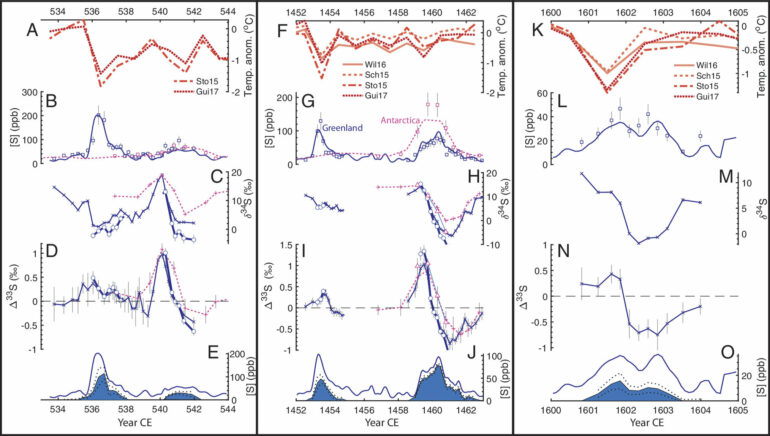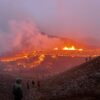New international research led by the University of St Andrews reveals historical high latitude volcanic eruptions caused dramatic, but short-lived climate cooling.
The new study, led by the School of Earth and Environmental Sciences at St Andrews with international colleagues from Switzerland and the U.S., and published in the Proceedings of the National Academy of Sciences (PNAS) (Nov. 6), finds that massive volcanic eruptions caused historical global cooling. The paper is titled “High sensitivity of summer temperatures to stratospheric sulfur loading from volcanoes in the Northern Hemisphere.”
Unusually cold decades, such as the 540s, 1450s, and 1600s, are associated with large volcanic eruptions, resulting in volcanic sulfate particles reflecting incoming sunlight. The source of the volcanic eruptions, however, and the amount of sulfate they injected into the upper atmosphere, is unknown.
To address this, the international team of researchers, led by Dr. Andrea Burke from the University of St Andrews, studied sulfur isotopes in ice cores from Greenland and Antarctica. The isotopes provided a fingerprint of the fraction of the sulfate that reached the stratosphere.
The results, correlated with tree-ring climate data, reveal that the largest historical cooling periods were due to volcanic eruptions at high latitudes. The results also show that the amount of sulfate injected into the stratosphere by these eruption events may have been around half that previously estimated, suggesting that summer temperatures may be highly sensitive to high latitude volcanic eruptions.
“Our data show that when Earth’s climate gets altered, other parts of the climate system can kick in to strongly amplify this initial change,” said Dr. Burke. “High latitudes feel these amplified climate changes particularly strongly, which is concerning given how rapidly these regions are changing today.”
According to the authors, the sensitivity of temperature to high-latitude eruptions highlights the role of climate feedbacks, such as sea ice extent and ocean heat content, in amplifying changes in global climate.
More information:
Andrea Burke et al, High sensitivity of summer temperatures to stratospheric sulfur loading from volcanoes in the Northern Hemisphere, Proceedings of the National Academy of Sciences (2023). DOI: 10.1073/pnas.2221810120
Provided by
University of St Andrews
Citation:
Study shows historical volcanic eruptions triggered short-term global cooling (2023, November 7)



